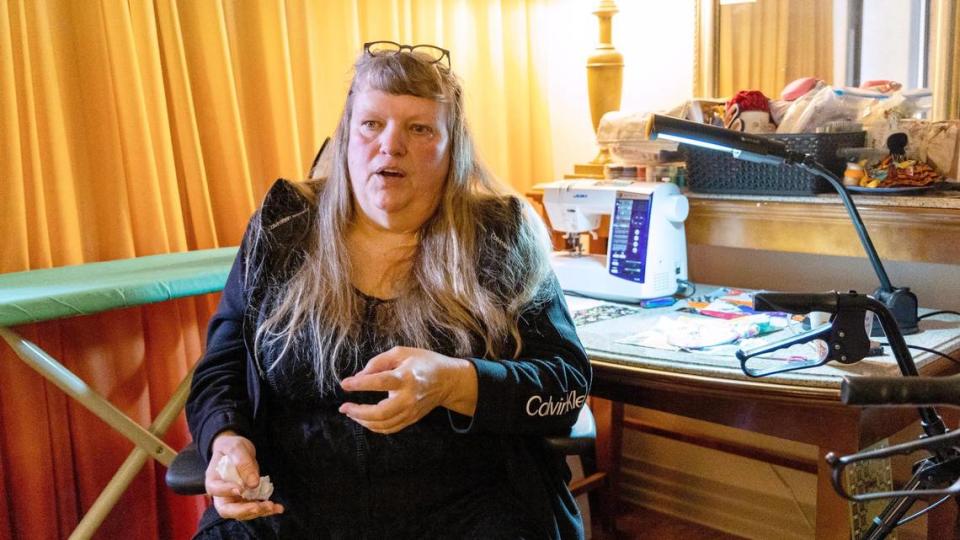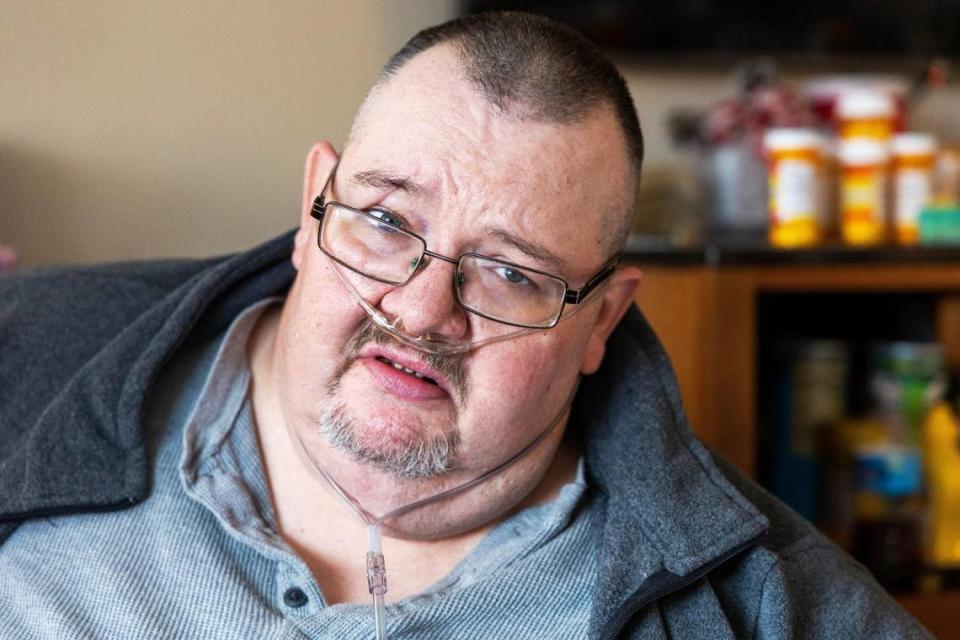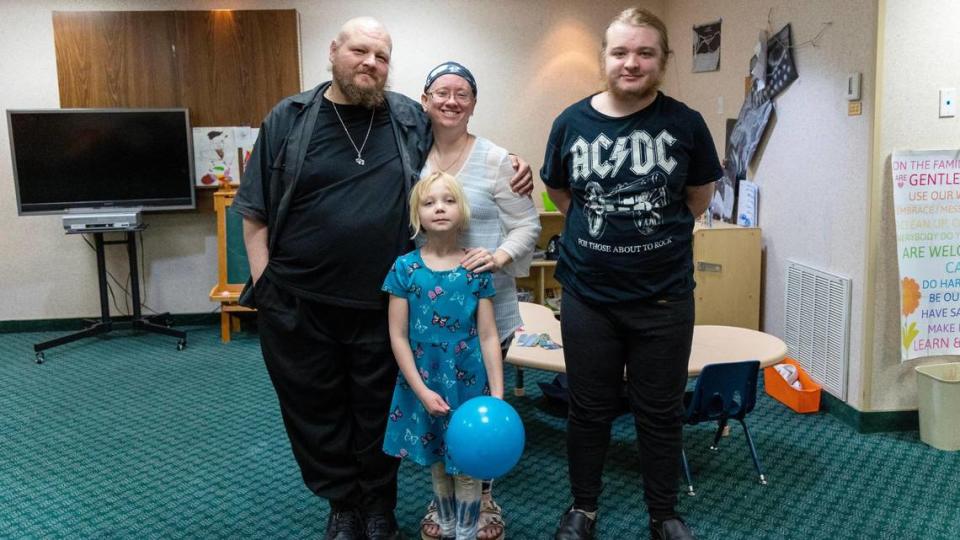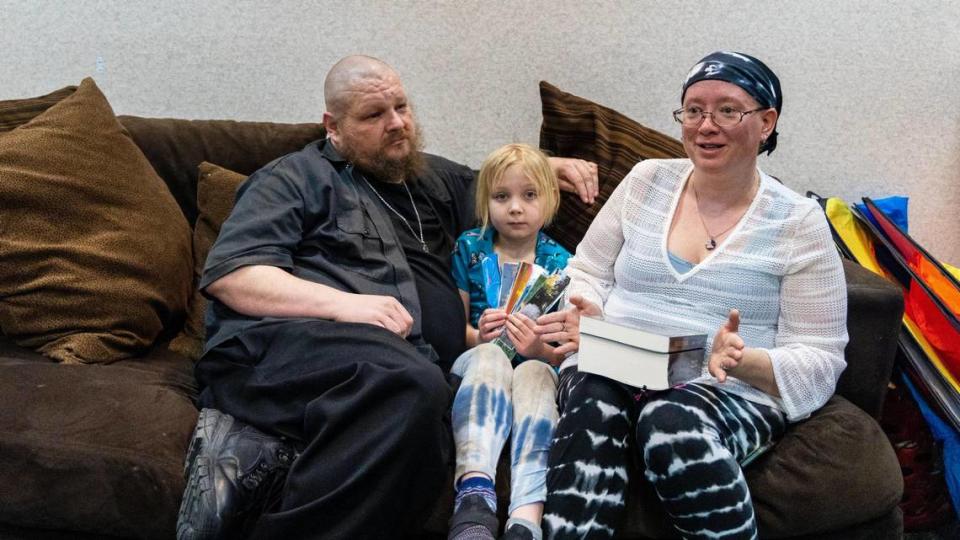‘Like I’m human again.’ From the streets to finding shelter in Boise | Opinion
Gerri-Lynn Graves is “a mom from Hyde Park” who first experienced homelessness after she lost her job because of medical issues, including a torn ACL at work, a broken back and a surgery that went very wrong.
Jimmy Coonce was living in a trailer next to the Payette River near Emmett when he was rushed to the hospital, where he spent 102 days because of congestive heart failure, bad lungs and other medical problems. When he left the hospital, he had nowhere to live.
April Kuper was diagnosed with breast cancer the same month her family had to leave the house they were renting because the owner wanted to do something else with it. April and her family of six couldn’t find anything they could afford, so she, her husband and their four children split up and found housing where they could, all while April began cancer treatments.
These are just a few of the people who are living at the Red Lion Hotel in Boise as part of Interfaith Sanctuary’s effort to house families and those who are medically fragile, an effort that started during the COVID-19 pandemic.
That effort has been the subject of a tug-of-war between Ada County commissioners and the city of Boise that made headlines this month, when Republican commissioners decided that they would no longer fund Interfaith Sanctuary’s program to house residents at the Red Lion Downtowner. Boise Mayor Lauren McLean said she was “shocked and deeply dismayed” at the decision and vowed to find a way for the city to keep the program going.
County commissioners in December authorized $697,600 of federal money to house residents at the Red Lion. That money runs out in April. The city of Boise asked the county to pay another $2 million to keep residents at the Red Lion through 2024. The commissioners declined.
The people who are staying at the Red Lion would be served by Interfaith Sanctuary’s new shelter on State Street, which will include private rooms, rooms for families, a clinic and hospice care.
But the completion of that new campus is still a year or more away.
In the meantime, because of restrictions and special circumstances, there are few to sometimes no options at all for some of the residents at the Red Lion.
Because of the hotel program, medically fragile residents are able to receive in-home health care that they’re not able to receive in a dormitory setting. The Kuper family is able to stay together, which would otherwise be impossible because April’s husband, Chris, works the overnight shift and sleeps during the day.
If not for the Red Lion setup, some 50 people being housed there would be moved to Interfaith Sanctuary’s shelter on River Street, and 50 residents there would be displaced.
Much of the debate has been about money, the best way to fund programs, and the various conflicting philosophies and theories about solutions to homelessness.
What gets lost in the debate is the humanity and the individual stories about the real people who are affected.

‘Mom from Hyde Park’
Gerri-Lynn Graves is a quilter, artist, jewelry maker and writer. She makes quilts, pillows and afghans, and writes about people experiencing homelessness.
She’s been a resident at the Red Lion since August. Before that, she was on the street for about a year.
She would sleep at Interfaith Sanctuary at night, and during the day look for a warm place in the winter, a cool place in the summer, a coffee shop, the library.
“You can never know how soul-crushing it is to feel like no one cares about you,” Graves, 55, said in an interview in her room at the hotel. “That’s exactly what we feel on a daily basis (on the street).”
She described herself as “a mom from Hyde Park,” and if you met her in a coffee shop or at the grocery store, that’s exactly what you’d think.
Her room at the Red Lion is neat and homey, more like a studio apartment than a hotel room. The aroma of coffee filled the room from a pot she had just brewed.
When I asked her what it’s meant to be housed at the Red Lion, she broke down crying.
“Like I’m human again,” she said. “You feel inhuman out there. People say the rudest things to you.”
Being homeless takes a lot of work.
Just trying to find a place to go to the bathroom, wash your hands, do your laundry, take a shower, cook a meal, stay warm or cool, connect to the internet or buy healthy food that you don’t have to cook by using food stamps — the simplest things that most of us take for granted — become daily struggles on the street.
At the Red Lion, Graves is able to receive in-home therapy for her torn ACL, recover from hip replacement surgery and care for a compression fracture in her back.
Graves broke down again when I asked her where she’d be if they ended the program at the Red Lion.
“I wouldn’t be here,” she said, meaning living. “I had a really tough year.”
In addition to her health problems, surgeries, rehab and losing her housing, both of her parents died.
“I had no idea what a nightmare could actually be,” she said between sobs. “I had a really dark year. If it hadn’t been for the staff and this place where I could just have some peace and quiet, I wouldn’t be here. And that’s the truth. I was going down fast. It’s really hard to go from being a mom in Hyde Park to living with a couple hundred people that are also on the worst day of their life.”

‘Smiling more every day’
Jimmy Coonce spent 102 days in the hospital. His medications are laid out neatly and organized by time of day on the dresser in his room at the Red Lion.
He’s been at the hotel for two months now, and he says he feels better every day.
“My lungs are getting better every day,” he said. “Growing stronger every day, smiling more every day. There is hope at the end of the tunnel.”
When I asked him where he’d be if he weren’t at the Red Lion, he nodded his head matter-of-factly toward the window.
“Streets,” he said. “Homeless. Dead. I wouldn’t be able to take my medications, or they would have stolen my insulin. I wouldn’t have reminders to take my medication.”
Coonce went straight to the Interfaith Sanctuary shelter on River Street after he got out of the hospital.
“It scared me when I first pulled up to it,” he said. “But it’s really nice. The people are nice. I couldn’t ask for nicer people in the world. They’re caring, they’re giving. They pulled me out of a bad spot, where I was ready to commit suicide. Done. And then they made me see the light.”
But his stay at Interfaith Sanctuary was short-lived, just two days, before he got sick again and ended up back in the hospital.
“So I said, ‘Oh, oh man, what do I do now?’ ” Coonce said. “So I went to the hospital and got discharged. So I thought I was going from the hospital into the streets. They (Interfaith Sanctuary) picked me up and took me over here (Red Lion) and put me in here.”
Interfaith Sanctuary is working to get Coonce appropriate health insurance that will pay for physical therapy and home health care. For the time being, the shelter is helping Coonce get to doctor’s appointments. Because of health privacy laws, Interfaith is unable to provide home health services in an open dorm setting, so without the Red Lion space, Coonce would be out of luck.
It’s hard — if not impossible — to find assisted living facilities for people like Coonce, which means the only other option is the street.
He spends his time on his laptop and takes photos.
“Oh, I love it here,” he said. “It’s really nice. The food’s good. The people are nice here. I go outside any time I want to. I go to Walmart any time I want to. I have nothing to hold me here. I work on my laptop to keep busy. I got my camera, take pictures of birds outside the window.”
Originally from California, Coonce, 53, moved to Spokane when he was 20 and lived there for several years. He worked for a good company doing apartment maintenance for 22 years, and he owned two houses. He said he went through a divorce, which sent him into several years of depression.
“I didn’t care no more,” he said. “But I started caring again about a year ago.”
So what does the future hold?
“Only God can tell,” he said. “I hope it’s good. It’d be nice to get in my own little place, even if it’s assisted living, you know? I’ve got my own bedroom and can shut the door.”

‘In the gray area’
April Kuper was diagnosed with breast cancer in July 2021, the same month her family was forced to move out of the house they were renting. The family couldn’t find another place to rent at the time amid the Treasure Valley’s skyrocketing rental market.
Chris Kuper works 60 hours a week taking care of adults with developmental disabilities on the overnight shift. April says they’re in “the gray area” — they make too much to qualify for some of the low-income housing programs, but they don’t make enough to be able to do it on their own in this competitive rental market.
“I’ve never had a problem finding a place, so I looked and looked and looked, couldn’t find anything,” April said. “That was the crazy part, because I’m always able to find something, some way, and be able to do it. I’ve just never been actually homeless before.”
They made the tough decision to have their children live with April’s mother in a tiny two-bedroom house, while April and Chris lived where they could find a place, a hotel room for $800 or $1,200 a week, or a friend’s house for another week.
All while April was preparing for surgery and cancer treatment — all in the middle of the COVID pandemic.
Their situation got better when they landed a spot at the Red Lion in October 2021.
Coming to the Red Lion meant they had their family back together again. Shawn, 15, and Jesse, 8, were able to move to the Red Lion with April and Chris, while their 13-year-old son stayed with April’s mother, and their 22-year-old son is staying with a friend.
Both Chris and April grew up in Boise and have seen the booms and busts of the city’s housing market over the decades — but nothing like the boom over the past couple of years.
In addition to Chris’ job, the family makes ends meet by selling art, jewelry and tea on the side, and Chris makes and sells barbecue sauces.
Their dreams include opening a food truck. April has written two self-published novels and is working on a third. She does all her writing on her cellphone — no small feat, considering one of her novels, “A Nightmare’s Point of View,” is 925 pages long.
The Kuper family’s story has a happy ending, though. They’ll be moving out June 15 into temporary housing in Kuna while their new house is being built in Caldwell. The Kupers qualified for a new homeowner program through CATCH.
But the Red Lion has been a lifesaver, quite literally.
“There was a time where I had five days of no sleep,” Chris said. “And then we got picked up here and it was –”
“A huge relief,” April finished the sentence.
“So I mean, you know, these guys have given us much more than we could have ever hoped,” Chris said.

No alternatives
One thing that struck me in talking with the residents at the Red Lion was their overwhelming sense of appreciation.
“I try to live a life of gratitude,” Chris said. “First of all, I’m grateful for her cancer because that brought us all closer together, and it showed us that we can go through just about anything. I’m grateful for the homelessness … because it allowed everybody to work their muscles and show everybody how strong they are.”
Amazingly and admirably, through it all, Graves said she’s grateful for the experience.
“When you hear somebody that’s going through something that’s just as bad, if not worse than your own story, it makes me appreciate it that I don’t have it any worse than I do,” Graves said. “And I should be grateful for some of the things I do have.”
Yes, it’s a legitimate argument about the cost of housing people at a hotel.
As Commissioner Ryan Davidson said: “We’re paying hotel rates to shelter people who should be in a proper facility. I don’t know if it’s sustainable that much longer.”
But where’s the “proper facility”? Interfaith Sanctuary is working on one, but it won’t be ready until 2024 — at least. Even then, it likely will be at capacity the day it opens.
Ada County commissioners voted last year to eliminate funding to New Path, a housing-first apartment building for 40 people experiencing chronic homelessness.
Is putting residents up at the Red Lion the most ideal solution? No.
But what other solution is there right now?
Until we come up with something better, it’s clear the effort at the Red Lion is a worthy program, especially when you hear the stories of the residents and what the program has meant to them.
“I think we’ve forgotten as a whole in the United States what community is about,” Graves said. “And when you’re thrown into a community where you have nothing left, nothing left to offer anyone but your stories and your hearts and your friendship, it really makes you reevaluate life.
“This place and the staff and some of the people I’ve met taught me what it was to be in a community again. And I’m grateful.”

